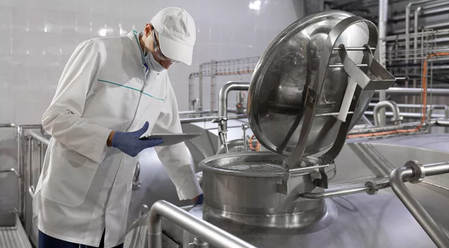 Those responsible receive new functions to control processes, architectures with regard to cybersecurity are at the cutting edge of technology and system availability and workflows have been improved - comprehensive added value for the process industry with lower overall costs in the life cycle of a plant
Those responsible receive new functions to control processes, architectures with regard to cybersecurity are at the cutting edge of technology and system availability and workflows have been improved - comprehensive added value for the process industry with lower overall costs in the life cycle of a plant
Rockwell Automation (NYSE: ROK) has released the PlantPAx 5.0 Distributed Control System (DCS). With the latest DCS version from Rockwell Automation, companies in the process industry can have a positive impact on the life cycle of their systems. The plant-wide, scalable system helps drive digital transformation and optimizes operational processes.
New functions of the system help to advance the digital transformation of manufacturing. Those responsible benefit from new possibilities with which they make machines in the system more available and thus ensure compliance in regulated industries. At the same time, they can enable analyzes at all company levels. Intuitive workflows and the use of industry-leading cybersecurity standards also help companies design and implement a DCS infrastructure that accelerates time-to-market and helps companies achieve faster profits.
"We are very pleased to offer PlantPAx 5.0 to our customers," said Jim Winter, Global Process Director, Rockwell Automation. “New functions of the system allow our customers to reduce the overall costs for design and commissioning. Since this reduces the costs for the life cycle of a system and minimizes the operational risks, the users have a clear added value through our innovation. "
The users of the new process control system receive a system that can be operated in a modern way and that throws off the burdens of a conventional DCS. The new version 5.0 offers advantages in the following areas:
Smaller footprint: The launch of PlantPAx 5.0 includes new process controllers. It also adds state-of-the-art processing power to the Logix product line, thereby reducing the complexity of PlantPAx architectures. This lowers the total cost of ownership (TCO) of the system over the entire life cycle. The footprint becomes smaller.
High consistency of projects: native process instructions are embedded in the controller firmware. Project teams can use these to implement control strategies that ensure consistency for individual projects or cross-location deployment. This consistency simplifies the lifecycle management of deployed systems when companies modernize their infrastructure for automation. The resulting consistency also lowers the total cost of ownership (TCO).
Streamlined workflows: PlantPAx 5.0 includes an streamlined design. This saves developers time when configuring measuring devices, alarms and elements of the diagnostic system. The operator can see the underlying control logic thanks to the extended options - safely and reliably. Maintenance personnel have access to controlled views for troubleshooting.
TÜV-certified for cybersecurity: In order to achieve top performance and at the same time ensure optimal cybersecurity, PlantPAx 5.0 system architectures are TÜV-certified according to the international standard ISA-99 / IEC 62443-3-3. This offers instructions for the implementation of an electronically secured system.
Ready for analytics: Process users have recognized analytics as an essential strategy for realizing far-reaching advantages when executing processes. PlantPAx 5.0 has frameworks that make it easy to integrate live and historical data from the DCS into reporting and analysis tools. For example, the new release enables augmented reality and workflows that can be harmonized with the process strategies for controlling a plant. Soft sensors, detection of anomalies and predictive models can also be integrated via scalable analytics, which allow predictive and prescriptive models in process solutions.
If manufacturing companies drive the digital transformation, the functions of the new version will help to lower the total cost of ownership (TCO) of the complete life cycle of plants.
www.rockwellautomation.com
























































































